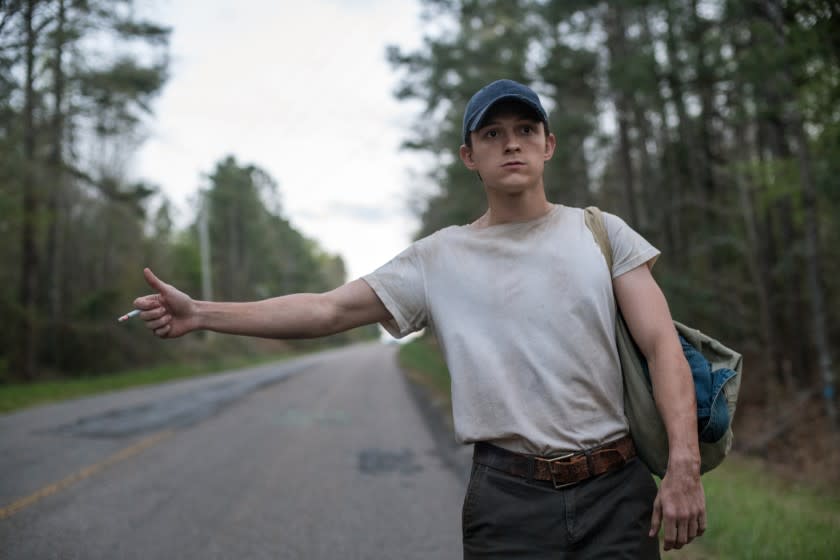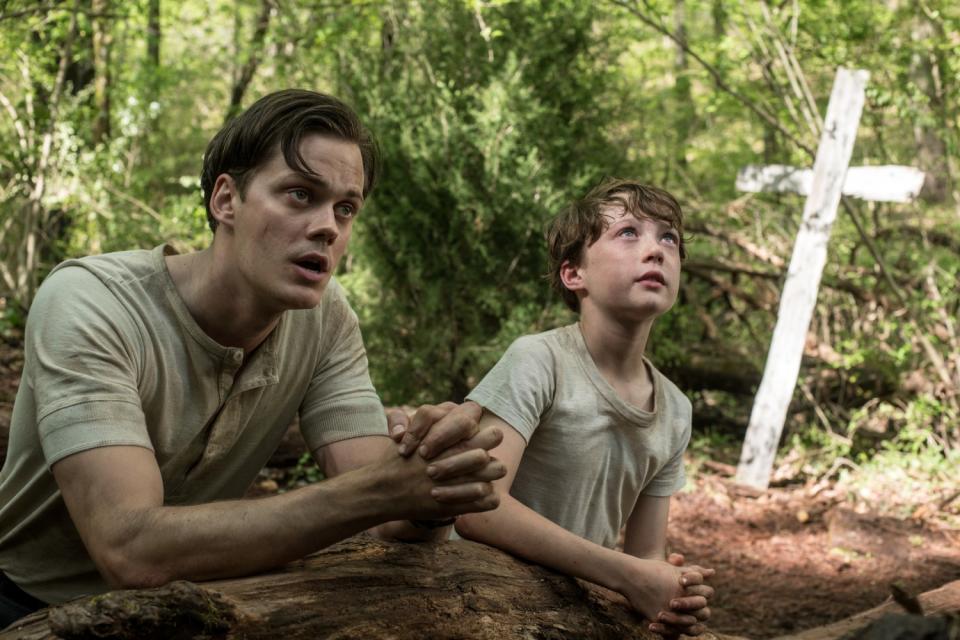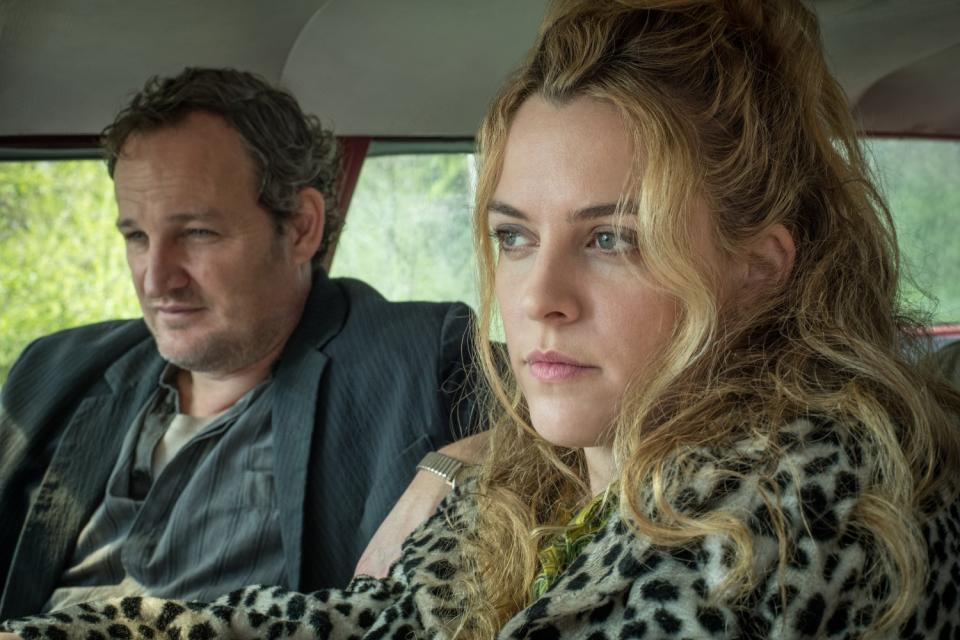Review: Sin is the true star of Netflix's bloody religio-gothic thriller 'The Devil All the Time'

The sins of the fathers are passed down with both a solemn hand and a diabolical chuckle in “The Devil All the Time,” a viciously coiled study in the banality of evil, the abuse of power and the diminishing returns of screen violence.
Cutting a bloody swath across Ohio and West Virginia in the 1940s, ’50s and ’60s, director Antonio Campos (“Christine”) weaves many tangled webs of lust, deceit, murder and suicide around a large ensemble of actors, including Tom Holland, Eliza Scanlen, Robert Pattinson and Riley Keough. You might say that sin is the movie’s true star: A cop serves his greed, a preacher indulges his lust and a young man unleashes his wrath. I’m not sure how to classify the gun-toting creep with the cuckold fetish, except to note that is less an outlier than a standard bearer, the nastiest distillation of this movie’s relentlessly nasty worldview.
That worldview arises from author Donald Ray Pollock, who not only wrote the 2011 novel that inspired the film (Campos and his brother Paulo Campos co-wrote the adaptation) but also lent his own voice as the film’s narrator. His observations about the residents of Knockemstiff — a real-life southern Ohio town presented here as a den of iniquity and inbreeding — give the proceedings a sardonic, down-home authenticity. They also provide a measure of withering satirical distance, especially whenever the story turns to the subject of religion, as it does often.

“It seemed to his son that his father fought the devil all the time,” Pollock remarks dryly of Willard Russell (Bill Skarsgård), a family man with a dangerous belief in his ability to not only discern the will of God, but also to negotiate with it. Willard, a World War II veteran, is traumatized by his memory of seeing a captured U.S. Marine nailed to a wooden cross and left for dead by his Japanese captors. The crucified Christ may be a symbol of hope and human redemption, but it has left Willard with a view of the Lord that skews decidedly Old Testament, and a belief that happiness and holiness sometimes demand payment in blood.
And so even as Willard forces his young son, Arvin (Michael Banks Repeta), to kneel alongside him in the dirt and pray before a makeshift cross near their Knockemstiff cottage, he also educates the boy on the finer points of violence, particularly when wielded in the defense of women. Some years later, after a series of events that finds him living hundreds of miles away in Coal Creek, W.Va., the teenage Arvin (now played by Holland) will prove himself to be very much his father’s son, doing his best and sometimes his worst to protect his sweet-souled stepsister, Lenora (Eliza Scanlen), from the harassment of high-school boors and bullies.
They are just a few of the characters populating this densely plotted, quasi-Southern religio-gothic, many of whom are arranged in tight narrative and thematic counterpoint to one another. We see Willard first courting Arvin’s waitress mother, Charlotte (Haley Bennett), around the same time another waitress, Sandy (Riley Keough), marries Carl Henderson (Jason Clarke), whose interests include driving, nature photography and other, less commendable pursuits. Meanwhile, Willard’s strict fundamentalism finds an even darker echo in a traveling fire-and-brimstone preacher, Roy Laferty (Harry Melling), with an unhealthy belief in the superiority of his own spiritual gifts.

Roy is mirrored in turn by the later appearance of another parson, Preston Teagardin, played by Robert Pattinson with the same lip-smacking comic flamboyance he recently brought to “The King.” In a cast full of English actors (Holland, Melling) and Australian actors (Scanlen, Clarke) seamlessly passing themselves off as Americans, Pattinson incarnates an inescapably European worldliness: To watch him smack his lips over chicken livers at a church potluck — or warn his flock, in a hilarious Southern-fried accent, against the dangers of falling victim to a “deluuuuuuuuuuusion!” — is to be momentarily transported into a different film completely, and one that looks even wilder, funnier and frankly a bit more fun than “The Devil All the Time” turns out to be in its sprawling 138-minute entirety.
Fun, of course, isn’t exactly being advertised. Certainly fun has never figured too prominently in the bone-chilling work of Antonio Campos, an independent filmmaker who made his name with realist horror films like “Afterschool” (2008) and “Simon Killer” (2012) and most recently directed the excellent psychological drama “Christine” (2016). Notably, all three of those earlier films functioned to varying degrees as commentaries on the addictive, manipulative properties of visual mass media. That element is absent from “The Devil All the Time,” which takes place in a world where Christianity is the dominant form of social control, with its unyielding grip on small towns and smaller minds.
The reductiveness of that thesis is mitigated to some extent by the expansiveness of the storytelling — or perhaps it’s the other way around. This is a movie that sits astride two conflicts, World War II and the Vietnam War, and treats the rituals of organized religion as a more local extension of their bloodlust. Self-professed men of God turn out to be showmen and charlatans at best, murderers and rapists at worst. They invite our scorn, which is not to say they are immune to our pity: Even the vilest character turns out to be in the grip of a deeply misguided longing for transcendence.

Those who willingly follow, meanwhile, are shown to be naive to the point of blindness, especially if — like the lonely Lenora or a hapless orphan named Helen (Mia Wasikowska) — they are unfortunate enough to be women. Keough’s wily Susan is one of the few exceptions, the rare woman who, despite and perhaps because of her spectacularly poor choice of husband, decides to rebel against her assigned lot in life. Matching her for shrewdness and recklessness is Lee Bodecker (Sebastian Stan), a local sheriff whose various corrupt rackets — by far the movie’s least interesting element — suggest that secular authority figures are no more trustworthy than religious ones.
How all these strands dovetail is a question that ultimately brings us back to Arvin, played by Holland as a kind of inspired flip side to his most famous role. There’s a streak of Peter Parker’s boyish innocence to Arvin, but his own demons are all too frighteningly credible. His journey bears out the movie’s conviction that all children are destined to repeat the mistakes of their parents, but it also suggests that, with a bit of wisdom, calculation and sheer luck, the consequences of those mistakes can be curbed and perhaps even reversed.
Arvin thus embodies the lone concession to optimism in a drama of all-consuming fatalism, and it’s fair to question whether that makes him the hero of the story or the punchline of a cosmic joke. I sensed a bit of the Coen brothers’ wicked irony in this movie’s backwoods-noir fatalism, and also a measure of their rigorous craft. You can reject the conclusions of Campos’ movie, particularly its unrelenting pileup of dead bodies, and still take pleasure in its atmospheric surface — in the persuasiveness of its small-town environs (shot on 35-millimeter film by the gifted cinematographer Lol Crawley) and the vigor of its performances. He may not persuade you all the time, but the devil is very much in those details.

